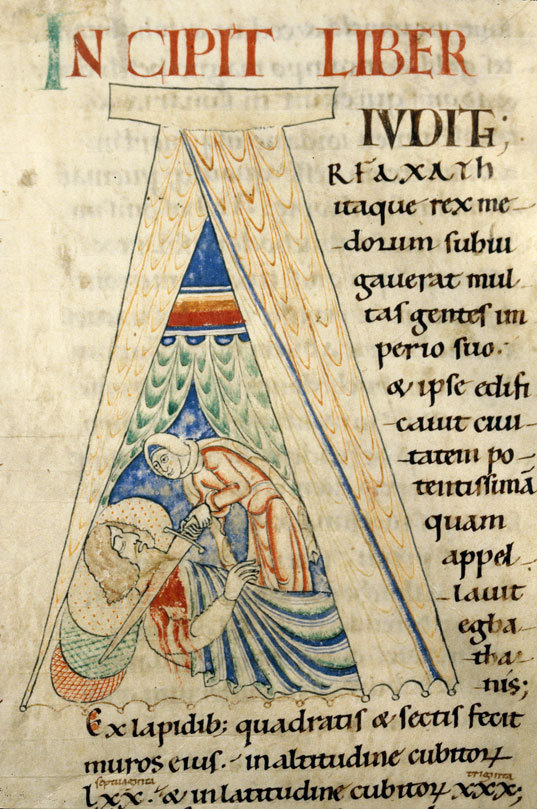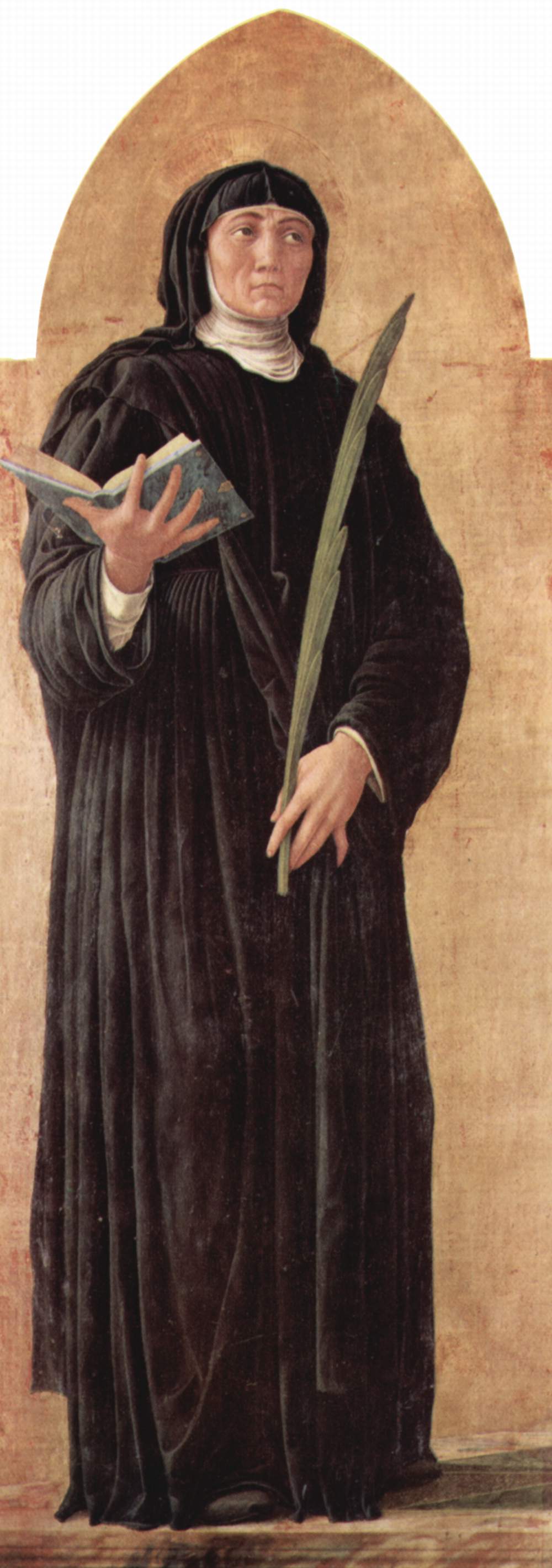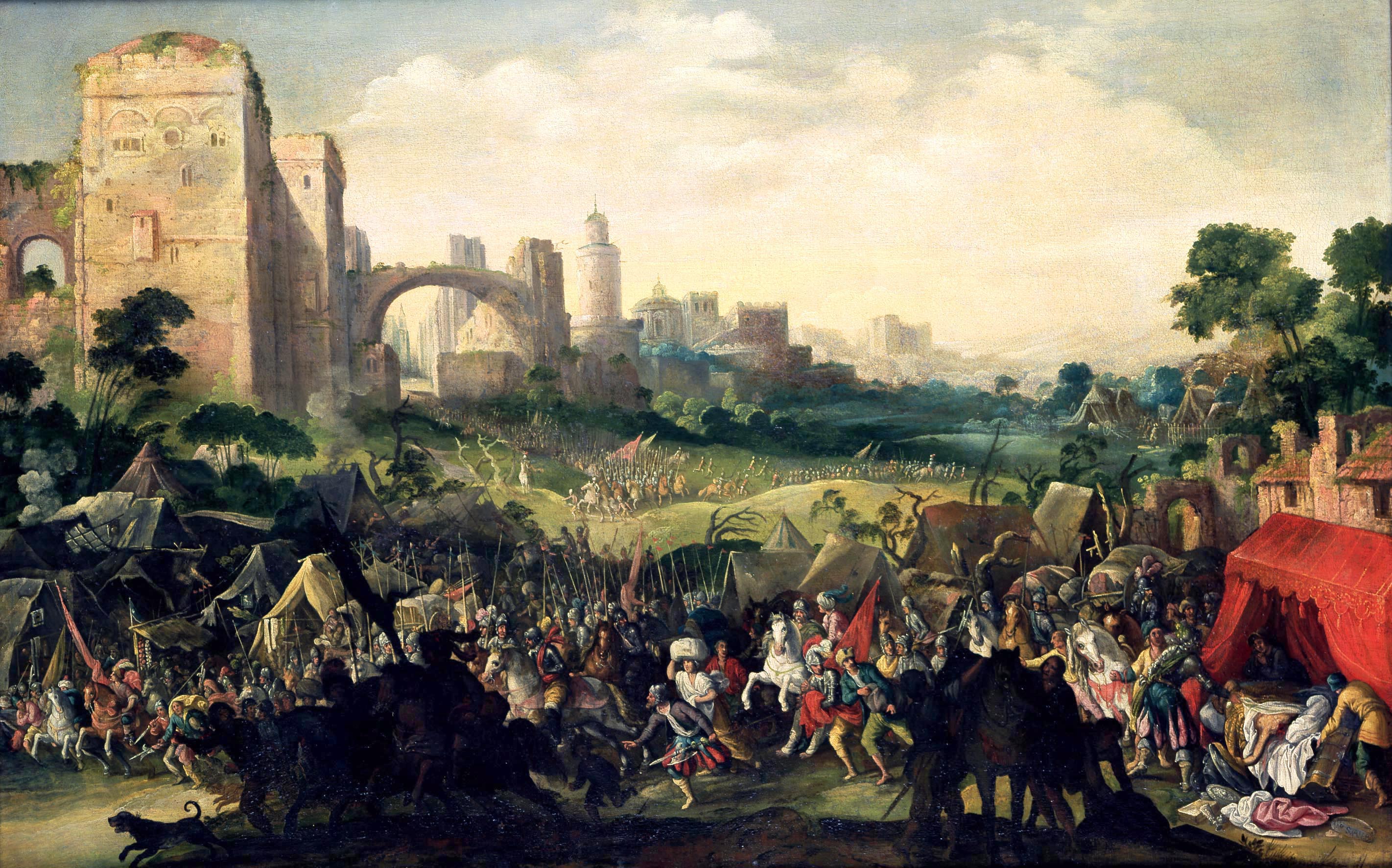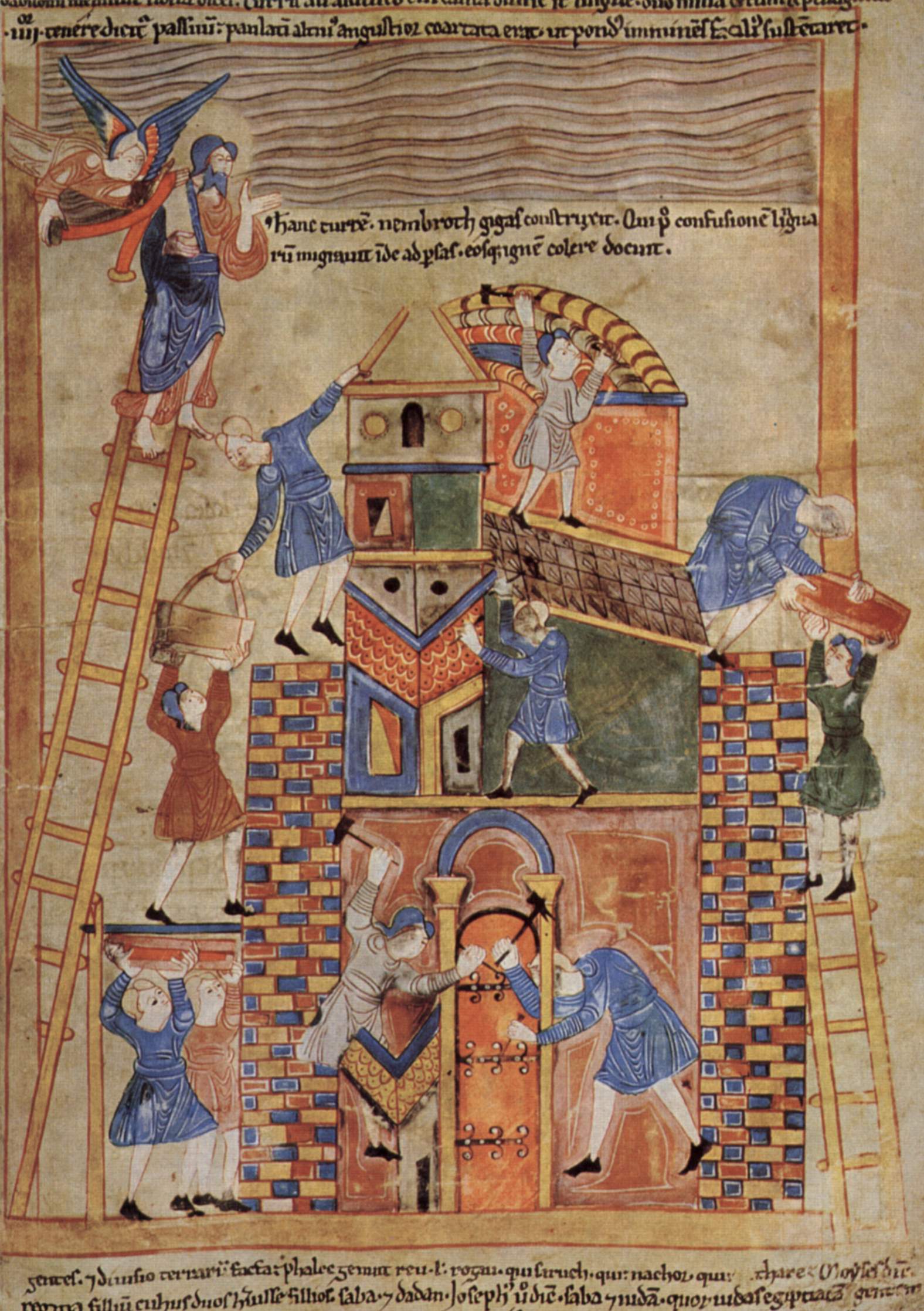|
Judith (homily)
Judith is a homily written by abbot Ælfric of Eynsham around the year 1000. It is extant in two manuscripts, a fairly complete version being found in Corpus Christi College Cambridge MS 303, and fragments in British Library MS Cotton Otho B.x, which came from the Cotton Library. The homily is written in Old English alliterative prose. It is 452 verses long. The story paraphrases the Biblical original closely. Ælfric ends the homily with a detailed exegetical interpretation of the story, which he addresses to nuns. In the first 190 lines, Ælfric introduces king Nebuchadnezzar and Holofernes, the leader of his army, whom he charges with conquering the land of the Jews. Holofernes complies and subdues most countries to the west of Assyria, except Bethulia, a Jewish town which resists the invader. At this point Judith is introduced. As in the Bible, Judith is depicted as a wealthy, independent widow, who after the death of her husband has chosen to remain single and lead a cl ... [...More Info...] [...Related Items...] OR: [Wikipedia] [Google] [Baidu] |
Homily
A homily (from Greek ὁμιλία, ''homilía'') is a commentary that follows a reading of scripture, giving the "public explanation of a sacred doctrine" or text. The works of Origen and John Chrysostom (known as Paschal Homily) are considered exemplary forms of Christian homily. In Catholic, Anglican, Lutheran, and Eastern Orthodox churches, a homily is usually given during Mass (Divine Liturgy or Holy Qurbana for Orthodox and Eastern Catholic Churches, and Divine Service for the Lutheran Church) at the end of the Liturgy of the Word. Many people consider it synonymous with a sermon. The English word homily is derived from the Ancient Greek word ὁμιλία ''homilia'', which means intercourse or interaction with other people (derived from the word ''homilos,'' meaning "a gathering"). The word is used in ("wicked ''homiliai'' corrupt good morals"). The related verb is used in (as ''homiloun''), and in (as ''homilei''), both used in the sense of "speaking with". The wor ... [...More Info...] [...Related Items...] OR: [Wikipedia] [Google] [Baidu] |
Jews
Jews (, , ), or the Jewish people, are an ethnoreligious group and nation, originating from the Israelites of History of ancient Israel and Judah, ancient Israel and Judah. They also traditionally adhere to Judaism. Jewish ethnicity, religion, and community are highly interrelated, as Judaism is their ethnic religion, though it is not practiced by all ethnic Jews. Despite this, religious Jews regard Gerim, converts to Judaism as members of the Jewish nation, pursuant to the Conversion to Judaism, long-standing conversion process. The Israelites emerged from the pre-existing Canaanite peoples to establish Kingdom of Israel (Samaria), Israel and Kingdom of Judah, Judah in the Southern Levant during the Iron Age.John Day (Old Testament scholar), John Day (2005), ''In Search of Pre-Exilic Israel'', Bloomsbury Publishing, pp. 47.5 [48] 'In this sense, the emergence of ancient Israel is viewed not as the cause of the demise of Canaanite culture but as its upshot'. Originally, J ... [...More Info...] [...Related Items...] OR: [Wikipedia] [Google] [Baidu] |
Christian Sermons
A Christian () is a person who follows or adheres to Christianity, a monotheistic Abrahamic religion based on the life and teachings of Jesus Christ. Christians form the largest religious community in the world. The words ''Christ'' and ''Christian'' derive from the Koine Greek title (), a translation of the Biblical Hebrew term ''mashiach'' () (usually rendered as ''messiah'' in English). While there are diverse interpretations of Christianity which sometimes conflict, they are united in believing that Jesus has a unique significance. The term ''Christian'' used as an adjective is descriptive of anything associated with Christianity or Christian churches, or in a proverbial sense "all that is noble, and good, and Christ-like." According to a 2011 Pew Research Center survey, there were 2.3 billion Christians around the world, up from about 600 million in 1910. Today, about 37% of all Christians live in the Americas, about 26% live in Europe, 24% live in sub-Saharan Africa, ab ... [...More Info...] [...Related Items...] OR: [Wikipedia] [Google] [Baidu] |
Judith (poem)
The Old English poem ''Judith'' describes the beheading of Assyrian general Holofernes by Israelite Judith of Bethulia. It is found in the same manuscript as the heroic poem ''Beowulf'', the Nowell Codex, dated ca. 975–1025. The Old English poem is one of many retellings of the Holofernes–Judith tale as it was found in the Book of Judith, still present in the Catholic and Orthodox Christian Bibles. The other extant version is by Ælfric of Eynsham, late 10th-century Anglo-Saxon abbot and writer; his version is a homily (in prose) of the tale. History and incompleteness ''Judith'' was first discovered as an appendage to the Nowell Codex. Though it is certain that the poem is a derivative of the Book of Judith, still present in the Roman Catholic Bible, its authorship and year of origin remain a mystery. The poem is incomplete: the version in the manuscript is 348 lines long, divided in three sections marked with the numbers X, XI, and XII. The numbers correspond to the 10th ... [...More Info...] [...Related Items...] OR: [Wikipedia] [Google] [Baidu] |
Eloquence
Eloquence (from French language, French ''eloquence'' from Latin ''eloquentia'') is the quality of speech or writing that is marked by fluency, elegancy, and persuasiveness. It is also defined as one of the aims of formal oratory and, in this context, refers to the artistic expression of the speech as opposed to its argumentation. Eloquence is both a natural talent and improved by knowledge of language, study of a specific subject to be addressed, philosophy, rationale and ability to form a persuasive set of tenets within a presentation. "True eloquence," Oliver Goldsmith says, "Does not consist ... in saying great things in a sublime (philosophy), sublime style, but in a simple style; for there is, properly speaking, no such thing as a sublime style, the sublimity lies only in the things; and when they are not so, the language may be turgid, affected, metaphorical, but not affecting." Eloquence in antiquity The word eloquence itself derives from the Latin roots: ''ē'' (a s ... [...More Info...] [...Related Items...] OR: [Wikipedia] [Google] [Baidu] |
Nuns
A nun is a woman who vows to dedicate her life to religious service and contemplation, typically living under vows of Evangelical counsels, poverty, chastity, and obedience in the Enclosed religious orders, enclosure of a monastery or convent.''The Oxford English Dictionary'', vol. X, page 599. The term is often used interchangeably with Religious sister (Catholic), religious sisters who do take simple Vow, vows but live an active vocation of prayer and charitable work. In Christianity, nuns are found in the Catholic, Oriental Orthodox, Eastern Orthodox Church, Eastern Orthodox, Lutheranism, Lutheran, and Anglicanism, Anglican and some Presbyterian traditions, as well as other Christian denominations. In the Buddhism, Buddhist tradition, female Monasticism, monastics are known as Bhikkhunī, Bhikkhuni, and take several Eight Garudhammas, additional vows compared to male monastics (bhikkhus). Nuns are most common in Mahayana, Mahayana Buddhism, but have more recently become more ... [...More Info...] [...Related Items...] OR: [Wikipedia] [Google] [Baidu] |
Chastity
Chastity, also known as purity, is a virtue related to temperance. Someone who is ''chaste'' refrains from sexual activity that is considered immoral or from any sexual activity, according to their state of life. In some contexts, for example when making a vow of chastity, chastity means celibacy. Etymology The words ''chaste'' and ''chastity'' stem from the Latin adjective ("cut off", "separated", "pure"). The words entered the English language around the middle of the 13th century. ''Chaste'' meant "virtuous", "pure from unlawful sexual intercourse" or (from the early 14th century on) as a noun, a virgin, while ''chastity'' meant "(sexual) purity". Thomas Aquinas links (chastity) to the Latin verb ("chastise, reprimand, correct"), with a reference to Aristotle's '' Nicomachean Ethics'': "Chastity takes its name from the fact that reason 'chastises' concupiscence, which, like a child, needs curbing, as the Philosopher states". In Abrahamic religions For many Jews, C ... [...More Info...] [...Related Items...] OR: [Wikipedia] [Google] [Baidu] |
Bethulia
Bethulia (, ''Baituloua''; Hebrew: wikt:בתוליה, בתוליה) is a biblical "city whose deliverance by Judith, when besieged by Holofernes, forms the subject of the ''Book of Judith''." Etymology The name "Bethulia" in Hebrew can be associated, in an allegorical sense, with "Beth-el" (house of God). If treated as a real geographical name, it can be explained as a composite word built from "betulah", virgin, and "Jah", Names of God in Judaism, the proper name of God in Judaism, God, so literally "YHWH's virgin". This suits the portrayal of Judith as a chaste widow and the book's emphasis on following religious rules, chastity among them. :de:Hugo Willrich, Hugo Willrich suggested in 1900 in his book ''Judaica'' that "Bethulia" is a corrupted form of "Bethalagan". Location It has widely been speculated that, based on location descriptions in the book, that the most plausible historical site for Bethulia is Shechem. Shechem was a large city in the hill-country of Samaria, on ... [...More Info...] [...Related Items...] OR: [Wikipedia] [Google] [Baidu] |
Assyria
Assyria (Neo-Assyrian cuneiform: , ''māt Aššur'') was a major ancient Mesopotamian civilization that existed as a city-state from the 21st century BC to the 14th century BC and eventually expanded into an empire from the 14th century BC to the 7th century BC. Spanning from the early Bronze Age to the late Iron Age, modern historians typically divide ancient Assyrian history into the Early Assyrian period, Early Assyrian ( 2600–2025 BC), Old Assyrian period, Old Assyrian ( 2025–1364 BC), Middle Assyrian Empire, Middle Assyrian ( 1363–912 BC), Neo-Assyrian Empire, Neo-Assyrian (911–609 BC), and Post-imperial Assyria, post-imperial (609 BC– AD 240) periods, based on political events and gradual changes in language. Assur, the first Assyrian capital, was founded 2600 BC, but there is no evidence that the city was independent until the collapse of the Third Dynasty of Ur, in the 21st century BC, when a line of independent kings starting with Puzur-Ashur I began rulin ... [...More Info...] [...Related Items...] OR: [Wikipedia] [Google] [Baidu] |
Holofernes
Holofernes (; ) was an invading Assyrian general in the Book of Judith, who was beheaded by Judith, who entered his camp and decapitated him while he was intoxicated. Etymology The name 'Holofernes' is derived from the Old Persian name , meaning "with wide-reaching glory", and is composed of the terms , meaning "wide", and , meaning "glory". Biblical account According to the Book of Judith, Holofernes had been dispatched by Nebuchadnezzar to take vengeance on Israel, which had withheld assistance in his most recent war. Having occupied every land along the coastline, Holofernes outlawed the worship of any god other than Nebuchadnezzar. Despite being warned against attacking the People of Israel by Achior, the leader of the Ammonites, Holofernes laid siege to the city of Bethulia. The city almost fell to the invading army because Holofernes' advance stopped the water supply to Bethulia, which led to its people encouraging their rulers to capitulate. The leaders vowed to surrende ... [...More Info...] [...Related Items...] OR: [Wikipedia] [Google] [Baidu] |
Ælfric Of Eynsham
Ælfric of Eynsham (; ; ) was an English abbot and a student of Æthelwold of Winchester, and a consummate, prolific writer in Old English of hagiography, homilies, biblical commentaries, and other genres. He is also known variously as ''Ælfric the Grammarian'' (''Alfricus Grammaticus''), ''Ælfric of Cerne'', and ''Ælfric the Homilist''. In the view of Peter Hunter Blair, he was "a man comparable both in the quantity of his writings and in the quality of his mind even with Bede himself." According to Claudio Leonardi, he "represented the highest pinnacle of Benedictine reform and Anglo-Saxon literature". Life and works Ælfric was educated in the Benedictine Old Minster at Winchester under Saint Æthelwold, who was bishop there from 963 to 984. Æthelwold had carried on the tradition of Dunstan in his government of the abbey of Abingdon, then in Berkshire, and at Winchester he continued his strenuous support for the English Benedictine Reform. He seems to ha ... [...More Info...] [...Related Items...] OR: [Wikipedia] [Google] [Baidu] |
Nebuchadrezzar II
Nebuchadnezzar II, also Nebuchadrezzar II, meaning "Nabu, watch over my heir", was the second king of the Neo-Babylonian Empire, ruling from the death of his father Nabopolassar in 605 BC to his own death in 562 BC. Often titled Nebuchadnezzar the Great, he is regarded as the empire's greatest king, famous for his military campaigns in the Levant and their role in Jewish history, and for his construction projects in his capital of Babylon, including the Hanging Gardens of Babylon. Ruling for 43 years, Nebuchadnezzar was the longest-reigning king of the Babylonian dynasty. By the time of his death, he was among the most powerful rulers in the world. Possibly named after his grandfather of the same name, or after Nebuchadnezzar I ( 1125–1104 BC), one of Babylon's greatest ancient warrior-kings, Nebuchadnezzar II had already secured renown for himself during his father's reign, leading armies in the Medo-Babylonian conquest of the Assyrian Empire. At the Battle of Carchemish in ... [...More Info...] [...Related Items...] OR: [Wikipedia] [Google] [Baidu] |






